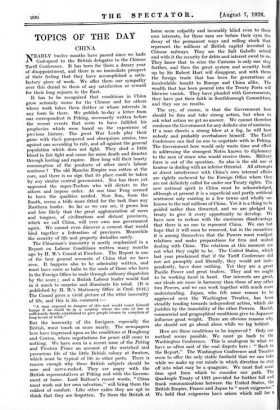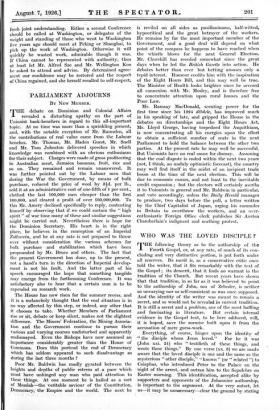TOPICS OF THE DAY
CHINA
NEARLY twelve months have passed since we bade God-speed to the British delegates to the Chinese Tariff Conference. It has been for them a dreary year of disappointment, and there is no immediate prospect of their feeling that they have accomplished a satis- factory piece of work. We offer them our sympathy over this denial to them of any satisfaction or reward for their long sojourn in the East.
It has to be recognized that conditions in China grow seriously worse for the Chinese and for others whose work takes them thither or whose interests in any form lie there. We publish to-day a letter from our correspondent in Peking, necessarily written before the recent events that seem to have fulfilled his prophecies which were based on the experience of previous history. The great War Lords play their game with their pampered and obsequious armies, two against one according to rule, and all against the general population which does not fight. They shed a little blood in fair fight and cause far more death and disaster through looting and rapine. How long will their hearty consumption of the products of other men's labour continue ? The old Manchu Empire was rotten at the core, and there is no sign that its place could be taken by any similar central government. Nor has there yet appeared the super-Tuchun who will dictate to the others and impose order. At one time Feng seemed to 'have the qualities needed. Now Sun, from the South, seems a trifle more fitted for the task than any Northern leader. So far as we can see, it grows less and less likely that the great agglomeration of races and tongues, of civilizations and distant provinces, which we call China, will ever own one government again. We cannot even discover a cement that would bind together a federation of provinces. Meanwhile the security of life and property dwindles surely.
The Chinaman's insecurity is neatly emphasized in a Report on Labour Conditions written many months ago by H. M.'s Consul at Foochow. The Report is one of the best general accounts of China that we have seen. It happens also to be admirably written, and must have come as balm to the souls of those who have in the Foreign Office to wade through ordinary dispatches by the score ; and a British Labour leader would find in it much to surprise and illuminate his mind. (It is published by H. M.'s Stationery Office in Cmd. 2442.) The Consul gives a vivid picture of the utter insecurity of life, and this is his comment :—
"A man exposed to dangers of this sort would count himself happy if he could be in a country where the rule of law is sufficiently firmly established to give people leisure to complain of long hours of work."
But the insecurity of the foreigner, especially the British, must touch us more nearly. The newspapers here have impressed upon us the conditions at Hongkong and-Canton, where negotiations for peace still come to nothing. We have seen in a recent issue of the Peking and Tientsin Times an account of the wretched and precarious life of the little British colony at Swatow, which must be typical of life in other ports. There is reason enough :why these British subjects should be sore- and nerve-racked. They are angry with the British representatives at Peking and with the Govern- ment at home. Lord Balfour's recent words, " China must work out her own salvation," will bring them the coldest of comfort. -Like other exiles they are apt to think that they are forgotten. To them the British at home seem culpably and incurably blind even to their own interests, for these men see before their eyes the decay of the permanent ways and rolling stock that represent the millions of British capital invested in Chinese railways. They see the Salt Gabelle seized and with it the security for debts and interest owed to us. They know that to seize the Customs is only one step further, and then the great system and security built up. by Sir Robert Hart will disappear, and with them the foreign trade that has been for generations of incalculable benefit to Europe and China alike. The wealth that has been poured into the Treaty Ports will likewise vanish. They have pleaded with Governments, they have put their faith in Southborough Committees, and they see no results.
The cry, of course, is that the Government here should be firm and take strong -action, but when we ask what action we get no answer. We cannot therefore condemn the Government for any definite sins of omission. If a man directs a strong blow at a fog, he will hurt nobody and probably overbalance himself. The Tariff Conference can find no one to negotiate with in Peking. The Government here would only waste time and effort in addressing the strongest Notes known to diplomacy to the men of straw who would receive them. Military force is out of the question. So also is the old use of hauteur in dealing with an inferior Oriental. All attempts at direct interference with China's own internal affairs arc rightly eschewed by the Foreign Offiee where they are not definitely called for under our Treaty rights. The new national spirit in China must be acknowledged, although at present it is a superficial and partly artificial sentiment only existing in a few towns and wholly um known to the real millions of China. Yet it is a thing to be guided rather than thwarted, and we are pledged by treaty to give it every opportunity to develop. We have now to reckon with the enormous disadvantage that there is no one to represent China. We can but hope that it will soon be removed, but in the meantime it is among themselves that the Powers must readjust relations and make preparations for firm and united dealing with China. The relations at this moment are not what they ought to be. The United States, which last year proclaimed that if the Tariff Conference did not- act promptly and liberally, they would act inde- pendently, have done nothing. Yet they are a great Pacific Power and great traders. They and we ought to be working hand in hand. Our interests are great, our ideals are more in harmony than those of any other two Powers, and we can work together with much more understanding. Japan, who felt some reason to be aggrieved over the Washington Treaties, has been steadily tending towards independent action, which she justifies by the immobility of the other Powers. Racial, commercial and geographical conditions give to. Japanese influence great weight. There are obvious reasons why she should not go ahead alone while we lag behind.
How are these conditions to be improved ? Only one method seems possible. We must - -go back to the Washington Conference: This is analogous to what we have so often said of the coal dispute here : " Back to the Report." The Washington Conference and Treaties seem to offer the only stable foothold that we can take while we make up our minds in which direction to step off into what may be a quagmire. We must find some firm spot from which to consider our path. The Quadruple Treaty of 1921 provided for further full and frank communications between the United States, the British Empire, France and Japan to " meet exigencies." We hold that exigencies have arisen which call for a fresh joint understanding. Either a second Conference should be called at Washington, or delegates of the weight and standing of those who went to Washington five years ago should meet at Peking or Shanghai, to pick up the work of Washington. Otherwise it will quickly be wasted work, admirable though it was. If China cannot be represented with authority, then at least let Mr. Alfred Sze and Mr. Wellington Koo be asked to attend and advise. By determined agree- ment our confidence 'may be restored and the respect of China regained, and she herself recalled to self-respect:







































 Previous page
Previous page